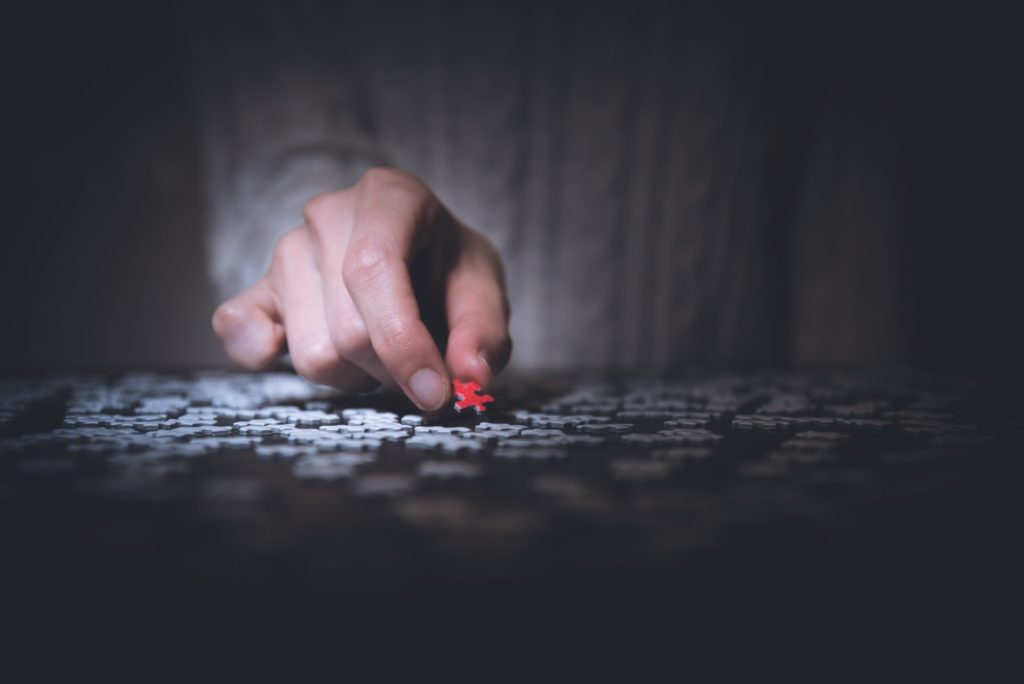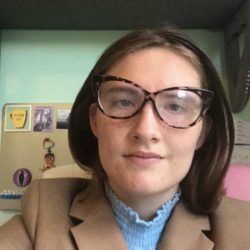Dear Autism,
There is a lot that I want you to know . . .
Many people see a label like autism as a lifesaver. Those who discover their diagnoses as adults usually wish desperately that they could have received them as children. Getting the label, they say, would have made them feel understood for who they were, saving them from years of being called “weird.” As such, in our society today, there is a push to ensure all autistic children are identified.
But there is another side to the story. Here, I want to share my experience with being given this label and let you know how it has affected me.
I was misdiagnosed with autism at age seven. I met zero percent of the criteria. This is even more surprising because I’m female, and girls are much less likely to receive this diagnosis. Many professionals believe autism is under-diagnosed in females, and every diagnosed female I’ve met feels lucky to have her diagnosis. All have a story of their autism being missed—of it being incredibly hard to be identified. Most I’ve spoken to think it would have been great to receive all of this help at a young age.
(Boy, how lucky I am!)
While I was too young to relay to you the exact reason I was misdiagnosed, I believe the psychologist based it on my moments of frustration stemming from being bored and under-challenged and the fact that I was the only child who chose not to play kickball in my small first grade class. She decided to give me the diagnosis just in case.

The thing is, many gifted students experience problems related to boredom and have different interests from their classmates. These are far from meeting the severity of a clinical disorder and are usually resolved by being placed in a more challenging curriculum with like-minded peers. Several parts of my psychologist’s report are either missing key data or dramatizing things such as me not asking for a tissue as “problems with verbal requesting skills.” My mother remembers that when she was given the report, they said to her, “Now you can get services.” It sounds like I was diagnosed even if the criteria was vague just so I could get some help.
The thing is, I didn’t need the help. I don’t need therapy or accommodations. I want others to know that mental health over-diagnosis is not benign—and that receiving therapy and accommodations I did not need hurt me.
I want others to know that mental health over-diagnosis is not benign—and that receiving therapy and accommodations I did not need hurt me.
The best argument for diagnosis that I’ve seen gives a three-part purpose: Services, Community, and Explanation. While I don’t dispute that there are benefits in these areas when the diagnosis is accurate, when misapplied, there will be harm instead. Allow me to illustrate how, in all of these areas, my diagnosis did damage.
Services: When They’re Unneeded
The therapy I was given made me feel constantly on guard. It taught me—and this was reiterated for years—that I could not possibly fit in.
When I would then go out into the world, instead of feeling supported by the services, I would struggle to interact. They had shut down my natural instincts, replacing them with self-doubt. In my head I would be telling myself, “You have autism. These people don’t get you. Think of the right thing. You won’t understand them. They won’t understand you.” I was taught, essentially, to fear the outside world because I would be overwhelmed or misunderstood.
But I’m not.
If I had trusted my natural instincts, I could have walked through the supermarket or had a conversation with neurotypical people, and it would have felt completely ordinary. I once had to make a phone call for a class, and after it ended, I started crying. Not because I was scared, or because it was hard—but because of how easy it had been. How I’d said the right thing just from what came naturally. After that, I was angry, so angry, at the autistic community for all they had wrongly told me over the years about the challenges I would face.
I once had to make a phone call for a class, and after it ended, I started crying. Not because I was scared, or because it was hard—but because of how easy it had been.
Additionally, these treatments kept me isolated, so I missed out on core life experiences. I was given all sorts of accommodations, like extended time on tests, that I did not need in the slightest. Rather than making me feel relieved, this humiliated me. Using the diagnosis to explain my behavior resulted in people being “understanding” of problems that weren’t there. This wasn’t an issue of assumptions or stereotypes, as some autism activists decry: they were being perfectly understanding of someone with autism.
The problem was that I didn’t have autism.
It would be as if, every time you just casually mentioned that you didn’t like something, someone would reply, “I get it. It’s rough being depressed. Always take time to take care of your mental health. Keep on fighting. You’re beautiful.” The diagnosis did not make me feel less misunderstood, it made everyone—myself included—misunderstand me.
The diagnosis did not make me feel less misunderstood, it made everyone—myself included—misunderstand me.
Community: When It’s Not a Fit
Neurotypical people function differently biologically to people with autism. Just as an autistic person will struggle around their more typical peers, a neurotypical kid will struggle if she’s around only autistic peers. Neurotypical kids need more active conversations. They need their social cues acknowledged just as much as autistic kids need their unique social cues understood. The reason you don’t hear this acknowledged much is that it’s not often that you see neurotypicals in the minority.
That, however, was my experience. I was placed in autistic classrooms, with the adults in charge believing I would feel safe and at home. They thought being around “fellow” autistics would make me feel more comfortable.
And—you guessed it—it didn’t. Most of the people I met were introverts. They had so many unique fears and strange ways of communicating that I could not relate to them at all. They rarely reached out or initiated conversation. Our relationship was made up of hours of awkward silence.
I felt so isolated. I was scared—overwhelmed—by the chaos of the people around me. The teachers and counselors who advised me always said to try to be understanding of them—that they could be great friends once you got to know them. That’s easy for people who already have their social needs fulfilled to say. That was not me. As painful as it is, if you are trapped in an environment where you do not belong, you have no choice but to reject it in order to break out and find what you truly need.

To further this point, medications meant to help people with psychological conditions are not intended for neurotypical brains. In fact, they can be harmful or even addictive when taken by those who do not need them. Drugs like risperdal, which is often prescribed for behavioral problems associated with autism, come with considerable risks that are only worth it if you have a real problem to overcome.
I took medications for at least five years. I did not need them. While they were prescribed to treat the sadness and nervousness I felt, they were not the right solution. They served to not only pathologize but also ignore the root concerns that would yield these feelings as normal responses, namely, the suffocating shame I felt from being tied to the wrong identity and the emotional trauma I suffered by being stuck in a therapeutic environment.
They also affected my physical health greatly. I constantly felt dizzy—so dizzy I could barely push myself to function. I would also get very, very hungry; to try and keep up enough energy to get through the day, I sometimes spent hours every morning eating. This hunger would regularly keep me awake at night. My body felt awful. I had frequent stomach aches and nausea. My mind just didn’t feel natural.
And they didn’t even help me feel less anxious.
If I tried to speak out against these medications, however, no one listened. The doctors blamed the side effects on stress and depression. They told me I was only insecure about medication, and if I accepted it, then I would be happy. They denied the possibility of a mental health prescription being harmful, insisting it was all the result of stigma.
While I am not equipped to comment on whether medication is generally over-prescribed or not, the reality is that people like me exist, and our stories and concerns should not be shut down to protect a particular agenda.
And I’m not just talking about the meds. They said these sorts of things when I complained about any part of my treatment. Saying therapy harmed me. Saying autism supports harmed me. And especially saying I don’t have autism, and that diagnosis can be inaccurate. “You can’t say that,” they insisted. “That creates a stigma. Mental health treatment is helpful. It just is.”
Before I became aware of my misdiagnosis, I’d felt the treatments I received were wrong, but my feelings had become so shut down that I’d started believing I was only depressed due to stigma and my own stubbornness. After I realized my misdiagnosis, however, I finally felt I had the right to choose what worked for me and say “no” to what didn’t. That was when I confronted the professionals in my life with what I’d learned and used that knowledge to make the decisions I’d always known—but didn’t trust—were right.
I stopped taking the meds.
I feel amazing. The best I’ve ever felt. The happiest and the healthiest.
Wow.
After all that, I can’t believe it’s possible.
Explanation: When It’s Wrong
While those who receive a correct diagnosis often report feelings of validation, when someone is given a label they do not need, their identification with it does damage. It’s disorienting to have others insist a diagnosis fits you when it doesn’t resonate with your experiences.
It’s disorienting to have others insist a diagnosis fits you when it doesn’t resonate with your experiences.
For a time, I entertained the possibility that they knew better. As I read autism advocacy websites and group forums, I found more to compound the distortions I’d been fed. There would be stories about how tapping their fingers when bored was “stimming” and vague statements about “struggles in conversations” that drew no responses. No matter what serious signs of disorder I lacked, I assumed that an awkward moment or a shy, nerdy personality was a sign of autism. Small natural human fidgets, having a hobby I was a geek about, disliking the sound of squeaky markers, not eating a side dish at dinner I didn’t prefer—I led myself to believe that all of these were complex, neurodivergent traits that made me stand out and had a deep significance.
Meanwhile, neurotypical people do all these things and don’t even notice it.
I almost failed a dance class because I believed that my Asperger’s meant I couldn’t escape being an awkward dancer. Having poor coordination, after all, is a part of the autistic experience.
It was only later that I learned it’s not exclusive to autism. Anyone can be bad at dancing. It’s not inherently a marker of a major cognitive difference. What’s more, anyone—but maybe especially people who don’t have autism—can learn and improve.
Anyone can be bad at dancing. It’s not inherently a marker of a major cognitive difference. What’s more, anyone—but maybe especially people who don’t have autism—can learn and improve.
The most confusing things I read in those online autism forums were the other participants’ reactions to the statement, “You don’t look so autistic.”
The replies would be along the lines of either “Yes, but it’s really hard for me in my head,” or “That’s because I’ve been abused to act normal.”
But these “normal” behaviors were natural for me.
When I read those statements, I felt as if any skills I displayed were not genuine, instead coming from a place of pushing myself extra hard to fit in. It felt as though no one in the autistic community would believe my social skills to be real, instead seeing them as a painful effort to “fit in.” Even if I wanted to be a leader, or be outgoing and enjoy conversations, it felt as though it wasn’t ever real—in thinking the label was true, I believed those things just had to be really, really hard for me. At worst, and most of the time, the notion that I was only “masking” continued to make me shoot down my true personality. Those forum participants were constantly reminding me that that outgoing leader who sometimes emerged just could not be me.
It felt as though no one in the autistic community would believe my social skills to be real, instead seeing them as a painful effort to “fit in.”
Many misinterpret my story. They think I just got the wrong sort of help or understanding. They think that I’m socially anxious. But I’m not afraid of social interaction. Rather, something happened to me that taught me I would surely struggle to handle it.
Those who struggle to hear what I’m saying can only understand what it’s like to not fit in. They can imagine needing a different sort of accommodation; what they can’t imagine is genuinely just not needing any help.
For this reason, narratives about embracing the outsider and breaking norms scare me when I hear them. I’ve been trapped in this story for so long, singing a song on repeat without ever really knowing the words.

My story is not one of breaking out of the norms. I’m sick of breaking out of them. My story is one of fitting in. And I don’t mean that like, “I am normal and society should change and understand that I do belong despite the world,” but, “Oh, duh, yeah, of course you can do that.”
There was no freedom from the diagnosis. No escape. No way for it to not affect who I was. There’s no way to simply brush it off like an unfortunate accident.
I was not a person with autism, but an autistic person. That was the language taught to me by the autistic community. They wanted to save me, but only saved their own pride.
This celebration of autism left any celebration of me feeling hollow. To provide an example, I came across a blog post on an autism community website entitled “How Satoshi Tajiri’s Autism Helped Create Pokémon.” Seeing that, I felt as if it did not matter what my name was or what talents I had—all of my strengths belonged to autism.
Realizing Your Old Narrative Was Wrong
Dear Autism, I am writing this because I want you to know—You. Don’t. Own. Me.
I distinctly remember the moment I realized something was wrong.
I was sitting in a beach house, just observing the room, and I recall my exact thoughts: “I am looking at a lamp. I am looking at this lamp through my autistic perspective.”
Though the label had always felt like a trap, it was there that it really hit me. Something was wrong. I couldn’t wait any longer. I had to get out.
That night, I contacted SENG to inquire whether they could help me investigate a misdiagnosis.
That’s the moment where I first joined the gifted community. That is how I got to be where I am today.
I understand that many feel celebrated because they are autistic—that they feel it affirms who they are. From where I stand, it can look like they feel there is no difference between what autism is and who they are—these things are one and the same.
What I can say is this: celebrating autism never felt like celebrating my true personality. I had been pushed so far into an isolating diagnosis that that diagnosis had overtaken my entire perspective. It was not something about me that I felt proud of, but some other force I had to sell myself to.
After my erroneous diagnosis, I endured years of traumatizing therapy, isolation, and medications, instilling countless forum posts’ worth of meaning to my smallest behaviors. I felt so empowered, so free, so understood when I discovered the label that would reframe them as a small, meaningless, minor personality trait: weird.
I felt so empowered, so free, so understood when I discovered the label that would reframe them as a small, meaningless, minor personality trait: weird.
I wish I was never “identified” when I was younger.
But hey, I’m sorry they called you “weird.” That must have really sucked.




